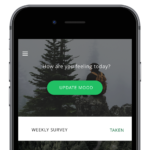
Lucy Simons invites YOU to tell us what you think are the most important questions about using digital technology for mental health.
There are also some fab prizes up for grabs, so don’t miss out!
[read the full story...]
Lucy Simons invites YOU to tell us what you think are the most important questions about using digital technology for mental health.
There are also some fab prizes up for grabs, so don’t miss out!
[read the full story...]
Today is the start of Digital Mental Health week, so look out for blogs, webinars, podcasts and loads of social media on the latest digital mental health research #DigiMHweek!
We start with Sarah Rowe blogging about a qualitative study that explores users’ experiences of an online intervention for bipolar disorder.
[read the full story...]
Olivia Kirtley looks at a qualitative study of a blended therapy using problem solving therapy with a customised smartphone app in men who present to hospital with intentional self-harm.
[read the full story...]
It’s #WorldMentalHealthDay today and the theme this year is promoting awareness of mental health in the workplace.
We’re getting in on the act with Chris O’Sullivan looking in detail at a recent systematic review of web-based psychological interventions delivered in the workplace, to improve employee wellbeing and effectiveness.
[read the full story...]
Joe Barnby and Muna Dubad explore a recent systematic review that looks at the potential predictors of adherence to web-based and mobile technologies for people with psychosis.
[read the full story...]
Leen Vereenooghe presents the results of an RCT of computerised cognitive behavioural therapy for people with learning disabilities, featuring the computer game “Pesky gNATs: The Feel Good Island”.
[read the full story...]
Natalie Nelissen from mHabitat publishes her debut elf blog on a recent systematic review of mental health apps for young people, which highlights the current dearth of reliable research to support the efficacy and safety of mobile apps.
[read the full story...]Mark Brown is feeling positive about the digital future on mental health after reviewing a new paper about ecological momentary interventions for depression and anxiety.
[read the full story...]
Ioana Cristea disputes the claims of a recent proof-of-concept RCT, which aims to prevent intrusive memories after trauma via a brief intervention involving Tetris computer game play in the emergency department.
[read the full story...]
Alan Underwood reports on the new OCTET trial published last week, which fails to find any support for the use of low-intensity guided self-help or computerised CBT for people with obsessive compulsive disorder (OCD).
[read the full story...]